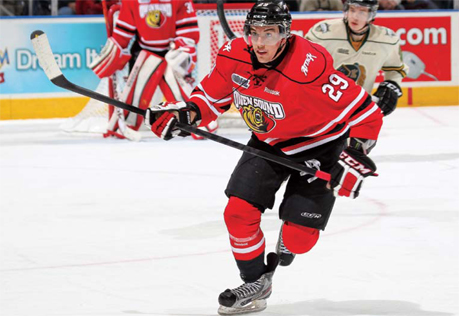
The Kootenay Ice and Owen Sound Attack were skating in warm-ups at the Hershey Centre in Mississauga, Ont., 25 minutes before the third-place tiebreaker game at the 2011 Memorial Cup. Fans were still filing in but the buzz had started long before the arena was half-filled, the buzz that went with the knowledge somebody’s season was going to end that night. Up on press row, Canadian Hockey League staff passed out the lineups to reporters: The Attack’s top two forwards, Colorado firstrounder Joey Hishon and captain Garrett Wilson, were both scratched with concussions.
Who was out was, for the media, the story. Who was in was not even a footnote, not with a stat line of one goal and two assists in 40 games. Nobody knew who Kurtis Gabriel was, at least nobody who started to pay attention to Owen Sound during the Attack’s improbable run to an Ontario Hockey League title. Those who followed the team all season knew that the 18-year-old had been a healthy scratch since January. They knew that, even when dressed at the start of the season, he saw only a couple of shifts a game. The coaches and players knew more. They knew all about his stint in purgatory: the miles he had skated after practice, the hours spent on the ice working with assistant coaches when others were in the dressing room, the tons he lifted in the weight room. “I could have quit every day, a hundred times,” Gabriel says. “It might have looked like I made a big mistake going to Owen Sound.”
He was finally going to be in the lineup but it wasn’t the first time he had walked in from the cold. If he went on to score the winning goal that night it would have been the end point of an amazing story. Didn’t happen: Kootenay, the Western Hockey League champs, rolled 7–3 and Gabriel was held off the score sheet. As it turned out, though, this was just the halfway mark of an impossible sequence of events.
This is a story about the longest of odds. Those who would splash cold water on a peewee or bantam who dreams of playing in the NHL would remind him that the odds are long for a kid in triple-A even making it to major junior and two or three kids out of every hundred in the CHL will land in the NHL, even for a cup of coffee. So what would a realist say to a teenager who never played triple-A hockey, who spent seasons playing in single-A? You’d laugh at a movie starring a kid who’s skating with a smalltown Jr. C team one fall and landing in an NHL camp a year later. But this isn’t a movie, so don’t laugh. Follow the story. Odds are it will never happen again in our lifetime.
Gabriel can’t recall how many times he had gone to triple-A tryouts. But he instantly recalls the number of times he had a sniff of interest from a team, a look past the first skate. “None,” he says. The biggest hole in his game was skating. He struggled to keep up and was pushed off the puck too easily. “There were times when I was out there and I couldn’t wait to get off,” Gabriel says. “I knew I wasn’t making it. I was a double-A player. There were 15 guys better than me every time I stepped on the ice.” But he didn’t know and the coaches who cut him couldn’t see what his best asset was. “The first thing I think of is his focus,” says Joe Pacione, Gabriel’s coach in double-A. “I had to push other kids but not him. Nobody was harder on himself than Kurtis. I went to him before tryouts one year and said that I thought he could play on our blueline. He looked me straight in the eye, dead serious, and said, ‘If I can’t make it as a forward, I don’t deserve to be on this team.’”
In his early- and mid-teens, hockey was just a game. In the summer, he was on the baseball diamond or soccer field. In the winter, he split time between the ice and the hardwood. At 15, it might have looked like his prospects were brighter in hoops than in hockey. He was a rangy forward with Denison Secondary in Newmarket, Ont., a provincial roundball powerhouse. Gabriel says he thought he would top out as a Canadian university player but his best friend and then-teammate disagrees and he’s entitled to his opinion. “Kurtis could have had a shot at a scholarship, maybe to a small school,” says Kevin Pangos, the former Denision star who has started at the point the past two seasons for Gonzaga University, one of the NCAA’s top-ranked schools.“I’ve never been around anyone who worked harder in the weight room. He just wouldn’t accept anyone going as hard as him. He’d just find another level.”
At 16, though, Gabriel made a decision to focus on hockey. He saw it as his best shot at an NCAA scholarship, but it was hardly a given. The first step was Midget triple-A, a no man’s land for hockey prospects. The top players in that age bracket have moved on to major junior. The second rank land in Jr. A, waiting for promotion. Midget triple-A is for those left behind. Gabriel went out and was cut by the York-Simcoe Express and had to travel to Markham to play with a weaker squad, the Waxers.
He showed enough for the Jr. A Newmarket Hurricanes to invite him to their training camp in the fall of 2010. The Hurricanes let Gabriel know about a tryout for a Jr. C team in Georgina, Ont. “They told me that if I wanted to get in a skate, I could go up there, get into a scrimmage,” he says. It ended up being a lot more than that. He racked up three goals, dropped the gloves with a guy who burned his toast and made a guy in the seats do a double take. “I saw him win all these battles in the corners and score. I asked the coach who he was,” Bryan Denney, a scout for Owen Sound, says. “I thought he was a 19-year-old.”
Denney went up to him when he came out of the dressing room and introduced himself, inviting him to the team’s tryouts. The 17-year-old Gabriel thought someone was pulling a prank on him until Denney showed him a business card. His mother, Kim, asked Gabriel who had been talking with him. “OHL scout,” he whispered, not wanting anyone else in the arena to hear it in case it all fell through.
Still, word leaked out.
The first to hear was a police officer—Gabriel was behind the wheel when the family car was pulled over as part of a spot-check. Next was Pangos, who remembers “just dancing around almost out of control, one of the happiest times of my life.” Then the Hurricanes coaches heard and tried to talk him out of the tryout, telling him he had a chance to be a big-time player with his hometown team, maybe even a chance to play for a national championship. The secret was completely out of the bag when Gabriel showed up to the tryouts, specifically when the players went through fitness testing. “It wasn’t just that he had the highest score there,” Denney says. “He set team records by a big margin and that includes guys at 19 and 20. Everyone was just sort of shocked by it. Eventually, there were guys just yelling, telling him to ‘go for it.’”
Gabriel’s story would be amazing enough if it had ended there, with him landing a spot on the Attack roster, or that season, when he spent all those hours in practice and in the gym while waiting for a spot, or that final game, getting a chance to play at the Memorial Cup. But, no, after that, the impossible happened.
The NHL called.
Gabriel wasn’t picked in the 2011 NHL draft. That just doesn’t happen for forwards with a goal and two assists. But Jeff Twohey, then a scout with the Phoenix Coyotes, phoned Gabriel and asked him if he would come out to the team’s rookie camp that fall. From a Jr. C practice to an NHL camp in a little less than 12 months after having played so few shifts in games that he could count them. Though the Coyotes liked what they saw, a league-owned team doesn’t have the pockets to sign projects. “I apologized to him because I didn’t think we gave him enough of a chance to show what he could do,” says Twohey, who’s now GM of the Oshawa Generals. And Gabriel didn’t get invited to a rookie camp last fall—they were scuttled by the NHL lockout. He might not have anyway, not off a 17-point second season in Owen Sound.
But he can count on at least that this fall. His numbers from this season won’t blow anyone away—13 goals and 15 assists in 67 regular-season games— but his is an exceptional case. “I’ve never had a player whose statistics tell you less about his value to the team,” Attack GM Dale DeGray says. “You have to see him every night, every practice, to see the energy he brings to the team. I don’t know where Kurtis gets it.”
Those who know him will hazard a guess. When Gabriel was 10 years old, he and his younger brother Iain were called out of class early and their mother was waiting for them. Kim told her boys that their father had died. Only that. No details. Kim would wait a few years before telling the brothers that their father had taken his own life. No further details. And not so long ago, she told them that he had left a letter but didn’t show it to them or get into what his last words had been.
Some might have questions but Gabriel hasn’t asked any. What he already knows he has pieced together from memories. He knows what he needs to know, he says. He has some memory of his parents’ breakup when he was seven. Some memory of his visits with his father. Of his father selling his car and guitar, his beloved possession, because money was tight. Of he and Iain having to walk everywhere. “I didn’t know at the time, but looking back there were signs that he was having trouble,” Gabriel says. He doesn’t see his father as a victim, doesn’t think life conspired against him. He thinks his father failed because he was “lazy,” a high school dropout who lacked ambition. Gabriel will tell you he’s moved past any difficult time. He’ll reject in the strongest terms possible that he’s a survivor. He will say that he’s his own man. And yet, others see his father’s suicide as shaping his character. “He has amazing inner strength,” Denney says. “His father’s death is a source of that strength. It’s a driving force in his life.”
Gabriel doesn’t know where he’ll be next season. He’s spoken with some NHL scouts and he hears that others have taken an interest in him. It goes week to week. “Thirty teams will probably hate to see this story,” DeGray says. “They think Kurtis is a secret, but just about everybody has asked us about him.”
Gabriel hopes his name will finally be called this June after having been passed over twice at both the OHL and NHL drafts. He hopes his story will play out like Andrew Shaw’s. An Owen Sound teammate of Gabriel’s, Shaw had gone undrafted twice before Chicago picked him in the fifth round in 2011. Failing that, he’ll hope to get another rookie-camp invitation. Maybe it will be a chance to sign on as a pro free-agent in the minors. Maybe he’ll go to the CIS and hope to follow the route Washington Capital Joel Ward took to make the NHL. He believes he still has room to grow. He just needs someone else to believe the same thing.
Kurtis Gabriel knows only one thing for sure. “I’ll work harder than anyone else,” he says. “I won’t quit. It won’t end here.”
@GareJoyceNHL

